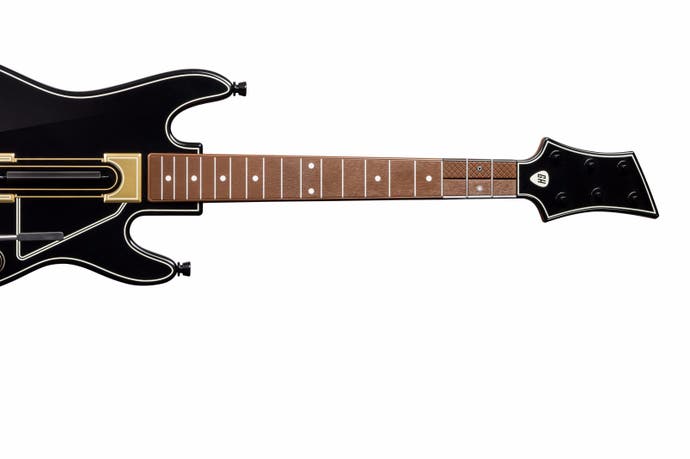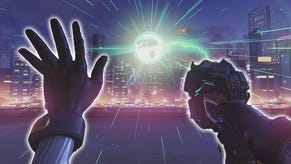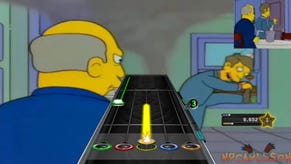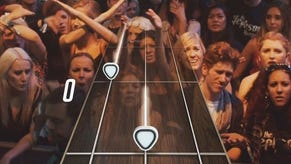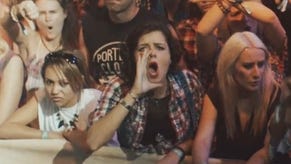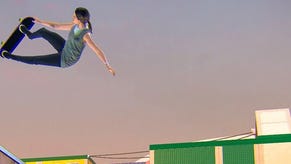Don't stop the music: Why Guitar Hero is making a comeback
Lick of paint.
If it truly is better to burn out than fade away, then the original Guitar Hero series was doing something right. In 2009, a mere four years after the series was introduced, Guitar Hero 3 became the first single video game to exceed $1billion in sales. Less than two years later the series was dead, a victim of its own excesses that brought the whole genre down with it. FreeStyle Games, developer of Guitar Hero's Activision stablemate DJ Hero, was one of many casualties.
"We went through some tough times, we had to let people go and I don't mind telling people it was the worst year of my life," says Jamie Jackson, creative director at FreeStyle Games. "We're a family, we care about each other and to have to go through that was f***ing horrible."
Things, thankfully, are looking up for FreeStyle Games right now. We're speaking to Jackson in Tammy Wynette's caravan, which would be odd enough on its own were it not for the fact that the caravan is sitting in an airy, breezeblock-walled room at the back of the Zephyr Lounge in Leamington Spa, a handful of minutes walk away from FreeStyle Games' small studio.
Jackson is excitable, energetic and sporting a long, dense beard that he's been growing ever since taking over FreeStyle Games' biggest project to date. Having nearly been sunk by its demise, the studio is now heading Guitar Hero Live, a revival of the series that's at the forefront of a new wave of music games. What killed the genre, what's changed and why is now the right time for a comeback?
FreeStyle Games was born before the music boom - formed of Codemasters and Rare staff, Jackson's own CV includes building the damage model for Colin McRae Rally 2 - but it's been synonymous with it throughout its life. Its debut title B-Boy, a 2006 PS2 and PSP breakdancing game, caught the attention of several big companies, and in 2008 when it was bought by Activision it found itself at the crest of a colossal wave. "It hit this sort of beautiful spot where all of a sudden it broke out and more people were playing games," says Jackson. "Popularity grew, there were casual and social games and music transcends so many boundaries. It brought people in."
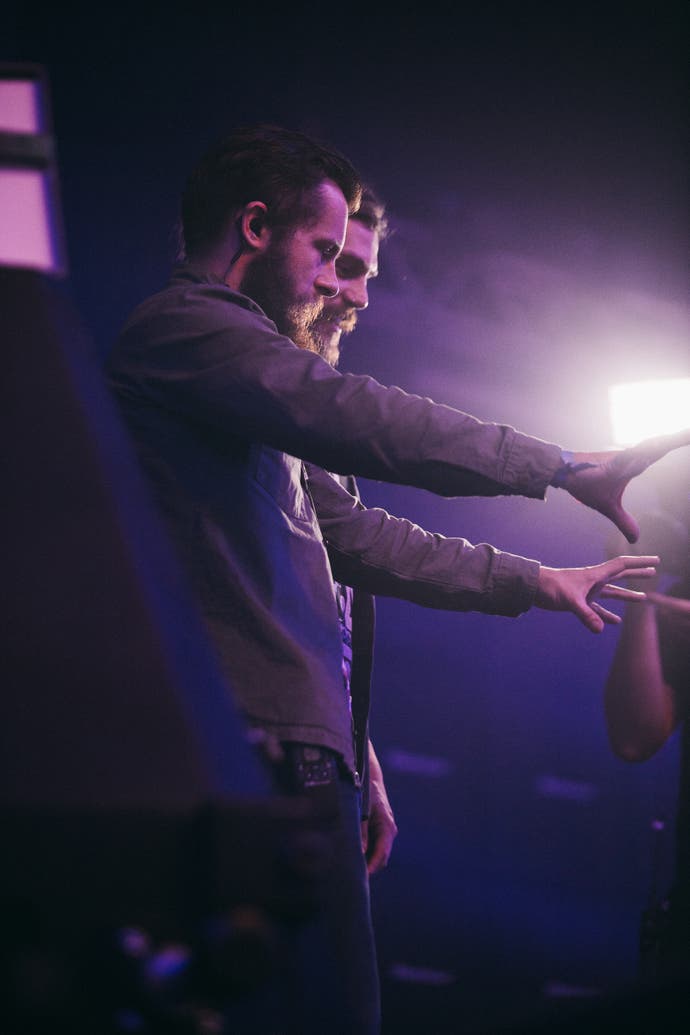
DJ Hero, FreeStyle Games' own contribution to the music genre, perhaps stands as the best of them; an achingly cool rhythm action game, it was the more dynamic, more experimental cousin to Guitar Hero, allowing for more player expression and proving less intimidating than its counterpart. As part of a glut of games with their own dedicated controllers, however, it was part of the problem rather than a solution to it.
"We made a lot of games, in a short space of time," says Jackson. "I like cake! But if I eat a lot of cake - I'm not going to want much more. More than anything, though, if you look at when DJ Hero 2 came out, Warriors of Rock came out, we also hit a global recession. Money wasn't around, and this was a product that was typically £40 more than any other game. We had this weird rest period in games where we didn't see it hit us straight away, but it did hit us eventually. That well ran dry, because no-one had much money. It's a combination of two things - we put a lot out, and all of a sudden people were like 'I don't have £100 to spend on this.'"
News of Guitar Heroes' downfall came in tandem with reports of FreeStyle Games being hit with layoffs, and concerns that the studio faced closure. It remained within the Activision family, though, partnering with Nintendo to make Wii U launch title Sing Party - a whirlwind process that saw the game conceived, designed and pitched over the course of a long weekend. "There were loads of positives that came out of it," says Jackson, who met his wife during the process. "At the start, we were like we don't want to do this anymore, but by the end of it there were so many good positives."
Soon after Sing Party wrapped, FreeStyle Games set about another, more ambitious project. "To be totally frank, we never stopped thinking about music games," says Jackson. "Even when we were making SingParty, we were thinking where to go next. One of the things we did when we was coming to the end of working with Nintendo was thinking about the future of the studio, what we should change and how to get out of this yearly cycle of making of a game." To help hit that goal, FreeStyle Games set up an internal R&D department to look into the future of the studio, the genre and what they could do with the game that started it all.
"I think it was Eric [Hirshberg, Activision CEO] that went out and talked about Hero when they put it on ice for a bit," says Jackson. "He said at the time we love this game, we love this franchise and we know the fans love it. We will always bring it back when there's some true innovation. We got tasked with finding that. It was a small team to start off with while we were putting the other game to bed. We basically set some rules. First, don't you f***ing dare use the old logo. I've got nothing against it, but we need to start from scratch. No flames, no barbed wire, no old logo. All we did was we said let's use the word Guitar Hero and see what we can do."
Nothing was off the table. FreeStyle experimented with camera devices, social games, and even toyed with the idea of doing away with peripherals altogether. "What we kept coming back to, though, is that Guitar Hero's about having this plastic guitar around your neck. That's why it's cool as f***. We went back to that, and that's when we started to think if we're going to give ourselves some limitation by using the guitar, how do we change it."
FreeStyle Games' main push was the controller itself, a more serious looking jet-black successor to what's gone before - as with the DJ Hero controller, the philosophy was to design something you wouldn't be ashamed to leave out in your living room - with a reconfigured button set-up on the fretboard. The guitar itself is handsome and stylish (Jackson has a history of product design before he set out in the video game industry), but it's that fretboard where the real changes have been made, with three banks of two buttons requiring a fundamental shift in the way you play.
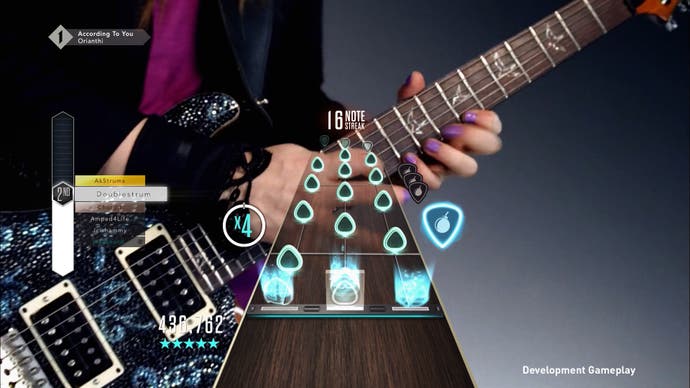
"We looked at what difficulty level people played, and around about 80 per cent only ever played Medium. And that meant they only ever used three fingers to play. I was one of them - cut that finger off my life wouldn't change. We were like, well, this game, there's two levels in it that are aimed at such a small section of people. We need to broaden that. We need to give people who only use three fingers a feeling of progression. That's what helped inspire the new controller."
Playing it is disorienting at first, though it soon clicks into place. What's important, though, is that it feels different enough to justify its existence: Guitar Hero Live isn't relying on nostalgia alone, and instead it feels like it's offering something that, with the guitar at least, is an improvement on what's gone before, even if it takes a small period of adjustment.
"I remember the green light meeting for it," says Jackson. "Eric [Hirshberg] and some of the executive team had the same response I had when we presented them the new controller layout. They were like, this is ridiculous, and I was like shut the f*** up and play it."
With the big guns on board, Jackson set about convincing the rest of Activision, booking out a nondescript meeting room for an impromptu gig. "We decked it out with black cloth, we put an uplighter and a smoke machine in it, I got a massive bin and filled it with ice and beers, and I made VIP passes for all the guys that were supposed to be there. I stood at the door, and if they didn't have the pass I was like, nah, get out. Pat Kelly came in, who's VP of all the studios, and I asked if he's got his pass. I made him go to his desk and pick it up. We knew at that point, we had people that excited about what we'd done. We weren't there yet, but we knew we had something."
Since development began in earnest on Guitar Hero Live a couple of years ago, it's become much more than a small-scale skunkworks project. There's a new look beyond the highway of notes that is, for want of a better term, full motion video: a first person perspective view of a performance that takes you from dingy backroom gigs (the Zephyr Lounge in Leamington Spa was one of the locations) to full-on arenas. With the latest Need for Speed also getting in on the act with live action intersections between its racing, it's a revival more unexpected than that of the music genre. Who knew that, in 2015, we'd see the mantle laid down by Dragon's Lair and Cobra Command picked up once again?

"I had this panic attack whether this would be the right thing to do, will it be like shit 80s games," says Jackson. "But when we saw it it looked cool - it didn't look like shit 80s games. Things have changed - people want more realism, they want to believe the environment they're in more. you look at adverts - the Destiny adverts are amazing, it's real stuff. I'm not saying it because it's Destiny. It's f***ing cool. We want to be brought out of our world and be put somewhere else, whether that's racing driver, army soldier or rock god. I think, as developers we're always trying our best to deliver on that. All of a sudden we can do this, and not like it used to be done. I was really surprised the Need for Speed stuff - but pleasantly surprised. And I hope there's more of it. It looks good. It makes you believe, and it looks different."
It looks expensive, too. Guitar Hero Live's first person sequences have been brought to life with full casts of aspiring musicians who fill the roles of genre-specific bands (there's even some connection between bands, even if it's kept bubbling under the surface - this is the first Guitar Hero game with its own lore) and using bespoke filming rigs. The footage has been embellished by Framestore, the Soho visual effects company notable for playing a key part in the making of Alfonso Cuarón's Gravity, and while there's less imperilled Sandra Bullock there's just as much slick deception as whole festivals are built out into the player's horizon.
Guitar Hero Live is an impressively full-blooded return, with a full budget, the full backing of Activision and a suite of new ideas that have helped refresh the series (which is more than can be said for another recent revival of an Activision staple, by the looks of things). What's going to make it different, though, and what's going to stop it making the same mistakes that were made last time?
The problem of overloading the market with multiple games has been addressed, even if Jackson and FreeStyle stop short of saying there won't be another disc-based game in the future. Guitar Hero TV - a service that allows you to dip in and out of music videos that are programmed across various channels, and that will keep new songs coming in on a regular basis - is part of that plan. "Guitar Hero TV gives us this great platform where you don't have to buy another disc. We've said we won't do another guitar - so you won't have to buy a new guitar next year or the year after. If you just want to continue using Guitar Hero TV there's going to be content there for you to do it. That's the idea. There's some beautiful things in there - we're going to be able to add game modes without you having to buy a new disc. That's really important for how we consume as a culture. Whether we do another disc or something, who knows. But I want to do something, because there's so many cool things we can do with Live."
There's a downside to all that, with the ability to download and own songs offline lost as part of the new system, a victim perhaps of the looser licensing that's allowed for a broader, more diverse selection of music to be streamed into the game. It's something people want from the game, so will the option ever return? "It's not something we necessarily want to do at launch. I don't agree with that statement - and I'm a vinyl collector. I'm a person who likes to own vinyl. But honestly, I couldn't tell you the last time I bought vinyl. I can tell you the last time I starred an album on Spotify - it was yesterday. I don't believe that anymore, we're moving away. There's still old folk like us who hold on to that, but give it five years and no-one's going to have a CD in their house. You buy so many albums, but how many do you listen to again. Now we just consume - we're such a throwaway culture now. We wanted to build something where people can do it how they want to do it. If that's playing a track three times, and being happy with it, there's a way for you to do it without feeling short-changed."
There are a couple of questions that remain over Guitar Hero Live, but from an afternoon spent clacking plastic and getting lost in its rhythms it's clear that it's a convincing comeback. If it does help revive the music genre, then one question surely remains: will FreeStyle Games ever return to the series that made its name, DJ Hero? "We get asked that every day at the minute. People are always like DJ 3! DJ 3! I'd make that game in a heartbeat, if it was up to me. I'm not trying to blow our own trumpet, but I think maybe DJ Hero was ahead of its time in terms of where the music scene was. I'd be lying to you if I said I wouldn't do it. It'd be really easy - just stick a camera behind the decks. So easy, man."
